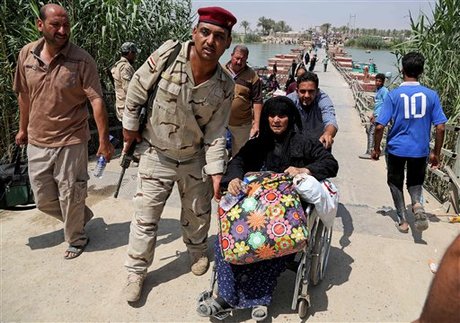U.S. Says Iraqi Forces Fleeing Ramadi Assumed Sandstorm Precluded Air Raids

Iraqi forces retreated from Ramadi in the face of an assault by Islamic State group fighters partly because they assumed -- incorrectly -- that a sandstorm prevented U.S.-led aircraft from coming to their aid with bombing raids, the Pentagon said Thursday.
The IS group on Sunday seized full control over the Anbar provincial capital in a major blow for the Baghdad government and the international coalition fighting the jihadists.
"The Iraqi forces in Ramadi believed that because the weather was what it was, that they would not be able to receive air power support," spokesman Colonel Steven Warren told reporters, referring to a sandstorm.
"We are now of the opinion that this is one of the factors that contributed to their decision to reposition out of Ramadi."
But he said the Iraqi commanders were mistaken in their assumption and that American-led warplanes were able fly in the area.
"What we know is that there was weather, that the weather did not impact our ability to conduct air strikes, but we are coming to the understanding that the commander on the ground believed otherwise and that was one of the factors that contributed to his decision to reposition," he said.
According to a tally of air raids by the U.S. military, American-led aircraft carried out seven strikes near Ramadi between Saturday and Sunday morning, as well as three near the western town of Fallujah.
A spokesman for U.S. Central Command, Colonel Patrick Ryder, said on Wednesday that there had been only "minor dust and haze" around the town that had "zero impact" on coalition air flights.
Warren said it was unclear "what the communication links were at the time" between U.S. forces and Iraqi troops in Ramadi before the city fell.
He called the Iraqi commander's move a "unilateral decision."
His comments came a day after General Martin Dempsey, the chairman of the U.S. Joint Chiefs of Staff, said the setback in Ramadi was not a direct defeat meted out by IS jihadists, because the local Iraqi commander believed the sandstorm in the area was going to prevent needed air power.
"The Iraqi Security Force was not driven out of Ramadi, they drove out of Ramadi," Dempsey said in an interview with The Wall Street Journal.
After the rout, Iraq's interior minister dismissed the police chief of Anbar province.



